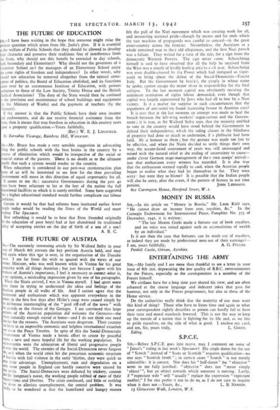THE FUTURE OF EDUCATION
ut,—I have been waiting in the hope that someone might raise the vious question which arises from Mr. Jacks's plan. If it is essential the welfare of Public Schools that they should be allowed to develop eir character and preserve their traditions free of interference from e State, why should not this benefit be extended to day schools, th Secondary and Elementary? Why should not the governors of a Grammar School and the managers of an Elementary School enjoy the same rights of freedom and independence? In other words, why should not education be removed altogether from the tainted atmo- sphere of politics, the Board of Education abolished, and its functions taken over by an autonomous Institute of Education, with powers analogous to those of the Law Society, Trinity House and the British Medical Association? The duty of the State would then be confined to the provision and maintenance of school buildings and equipment by the Ministry of Works) and the payment of teachers (by the Treasury).
If the answer is that the Public Schools have their own income and endowments, and do not receive financial assistance from the State, then it means that true freedom in education in this country rests upon a property qualification.—Yours faithfully,
(Rev.) W. E. J. LINGFIELD.
St. Barnabas Vicarage, Rainbow Hill, Worcester.


























 Previous page
Previous page